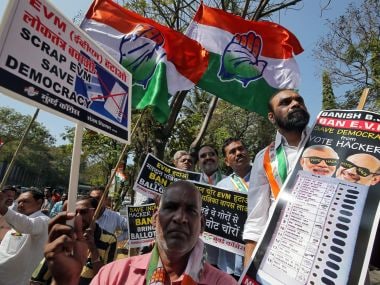Ahead of the 2018 Lok Sabha elections, the Election Commission has come out with yet another rule for potential candidates – in addition to existing asset and income declarations, they are required to provide five years’ worth of income tax returns of their dependents and themselves, and details of foreign assets owned by them. While some have welcomed this move, there is really only one justified response to this move: ho hum.
The EC’s move reminds one of a scene from the under-rated film Enemy at the Gates. A fictional Nikita Krushchev, as commissar in the Soviet Army battling the seemingly unstoppable Nazi war machine, is walking up and down the line seeking ideas from his terrified subordinates on how to put an end to the defeats. One particularly nervous political officer comes up with a brilliant idea: shoot any general who retreats. And their Chiefs of Staff. The one next to him comes up with an even better idea – shoot the retreating generals’ families too as examples!

Needless to say, the EC’s approach to handling the money and muscle problem in India’s elections sounds exactly like that. Like the Supreme Court (whose judgement initially led to the mandatory declaration of candidates’ assets and criminal records on affidavit), the EC’s approach comes at the problem from a very upper middle class perspective. One where elections are “polluted” by money and violence and needs to be “cleaned up”. Where the poor, uninformed voter is bribed into voting against her interest, and only needs to be presented with the facts to get her to change her mind.
The success of this approach speaks for itself — more candidates with a history of violent crimes are getting elected. The number of “crorepati” candidates has increased manifold. By all accounts, the attempts of the Supreme Court and the EC to “crack down” upon candidates with a criminal background and with ill gotten gains has failed miserably.
Instead of re-evaluating its approach, the EC has only doubled down on its flawed approach to the matter. While the latest move raises questions about privacy and confidentiality, it is also reflective of an approach to the regulation of elections that is entirely detached from the ground reality. The average Lok Sabha constituency has fifteen lakh voters but the spending limit is capped anywhere between Rupees fifty to seventy lakh. Even assuming that a candidate chooses to focus only on half the voters, that leaves the candidate with approximately Rs. 10 to spend per voter. Given the costs of reaching out to voters, organising rallies, and mobilising the vote, a candidate is unlikely to be able to meet these costs out of her own pocket using legitimate sources of funding unless she’s funded by the party or taps illegal sources of funding.
To be fair to the EC, it has made attempts to curb black money use and has sent across a proposal to the government to curb spending by political parties as well. Unfortunately, that still focuses on the wrong part of the problem and does not really answer the more troubling question — why do people continue to vote for candidates with criminal backgrounds and ill-gotten wealth.
The answer is complex but Milan Vaishnav’s book “Money and Muscle in Indian Politics” offers us some data driven insights. It is not as if voters don’t know about the political malfeasance of their representatives and it is not necessarily a failure of democratic accountability that they vote for them. Rather, the reasons range from ethnic identity to the ability to give them access to state services that makes electors vote for MPs and MLAs with criminal backgrounds. The myth of the ignorant voter being saddled with criminals in politics is just that, Vaishnav shows.
For those with a criminal background, an entry into politics is the way to have the cases against them dropped or at least gone slow on. Although the Supreme Court has mandated immediate disqualification on conviction, this has rarely affected politicians from the ruling party in the state in which the trial has been conducted. But why are political parties so keen on getting those with a criminal backgrounds and ill-gotten wealth into their fold?
One obvious answer, and some Vaishnav addresses in his book is their ability to self-finance election. The other, less obvious answer may lie in the nature of India’s Parliamentary democracy where the Government may prefer pliant legislators to make up the numbers rather than principled ones who may not be amenable to threat of anti-defection law to toe the line.
Not understanding this as the source of the problem means that the “solutions” offered will either do nothing to address it, or worse, exacerbate it. As it stands, the artificial spending caps only mean those with black money have an advantage over those who don’t, and compounded with the electoral bonds scheme, risks making the money problem even worse.
Much of this cannot be fixed by the EC alone (or even by the Supreme Court in its judicial interventions). Serious electoral reform will require changes to the ways in which parties control MPs and MLAs through anti-defection law. It will require much greater transparency in the way in which political parties raise and use their funds, and an acceptance that money is a necessary evil when it comes to electoral politics.
source: Firstpost.com






































